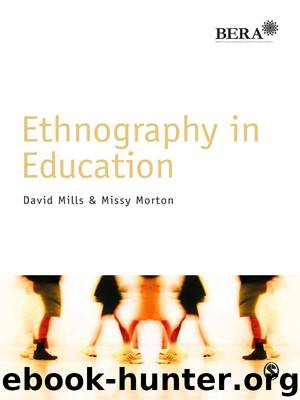Ethnography in Education (BERASAGE Research Methods in Education) by Morton Missy & Mills David

Author:Morton, Missy & Mills, David [Morton, Missy]
Language: eng
Format: epub
Publisher: SAGE Publications
Published: 2013-04-28T16:00:00+00:00
Policy ethnography
* * *
Educational ethnographies can ill afford to ignore the state. In Europe and its colonies the early provision of universal formal education was a defining feature of responsible statehood. Over the last four decades, ‘Education For All’ has become a rallying cry for global humanitarian interventions and the development ‘industry’, and the provision of schooling has become one of the most basic expectations placed upon national governments. It should be no surprise that social theorists of all stripes have sought to theorise the relationship between the state, schooling and the individual.
Back at the start of the twentieth century, Durkheim argued that Education amounted to ‘a continuous effort to impose on the child ways of seeing, feeling and acting at which he would not have arrived spontaneously’ (quoted in Lukes 1973, 12). Understanding the effect of state and institutional educational ‘structures’ on the ‘agency’ of individual students and teachers has continued to motivate scholars ever since.
The intensity of what has been called the structure/agency debate tends to wax and wane. During the heyday of sociological interest in ‘symbolic interactionism’ during the 1970s, educational ethnographers focused on the ‘micro’ level of social life, and in particular on the roles, symbols and signs that shape social relations. The larger political economy was left somewhat implicit, and instead the focus was on the classroom dynamics being observed. The primacy accorded to recording fine empirical detail, especially of dialogue and social interaction, was seen as a key strength of this microethnographic tradition.
This theoretical tension over whether to emphasise the influence of institutional structures or the free will of individuals is prominent in the work of the influential educational scholars Basil Bernstein and Pierre Bourdieu. Both put Durkheim to work in their sociology of education, and both sought to address the problem in different ways. Bernstein, particularly influential in the UK, tried to explore the different ways in which educational institutions framed and classified pedagogic knowledge (e.g. Bernstein 1971, 1996). Bourdieu was more expansive, and sought to make sense not only of the role that culture and bodily practice played in reproducing inequalities (Bourdieu 1977, Bourdieu and Passeron 1977) but also of the hierarchical forms of knowledge production within the university itself (1984). Towards the end of his career he became more explicit about the role scholarship could play in questioning the inevitability of neoliberalism (Bourdieu and Ferguson 1999, Bourdieu 2003).
Does one have to follow the twists and turns of these theoretical debates in order to be a good educational ethnographer? No, but as they raise profound questions about the role of learning in society, they can be hard for educational ethnographers to ignore (Ashwin 2009). In what follows, we introduce the history of this debate, before explaining why ‘policy ethnography’ offers one way to study these changes.
Download
This site does not store any files on its server. We only index and link to content provided by other sites. Please contact the content providers to delete copyright contents if any and email us, we'll remove relevant links or contents immediately.
The Art of Coaching Workbook by Elena Aguilar(51160)
Trainspotting by Irvine Welsh(21642)
Twilight of the Idols With the Antichrist and Ecce Homo by Friedrich Nietzsche(18622)
Fangirl by Rainbow Rowell(9228)
Periodization Training for Sports by Tudor Bompa(8253)
Change Your Questions, Change Your Life by Marilee Adams(7758)
This Is How You Lose Her by Junot Diaz(6877)
Asking the Right Questions: A Guide to Critical Thinking by M. Neil Browne & Stuart M. Keeley(5757)
Grit by Angela Duckworth(5604)
Red Sparrow by Jason Matthews(5466)
Paper Towns by Green John(5177)
Room 212 by Kate Stewart(5105)
Ken Follett - World without end by Ken Follett(4723)
Housekeeping by Marilynne Robinson(4436)
The Sports Rules Book by Human Kinetics(4379)
Papillon (English) by Henri Charrière(4262)
Double Down (Diary of a Wimpy Kid Book 11) by Jeff Kinney(4261)
The Motorcycle Diaries by Ernesto Che Guevara(4089)
Exercise Technique Manual for Resistance Training by National Strength & Conditioning Association(4061)
